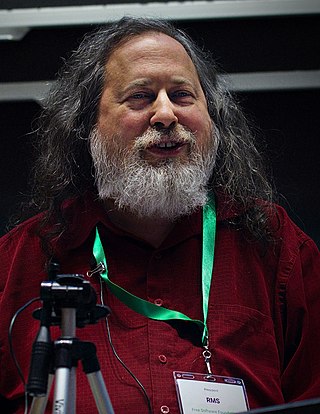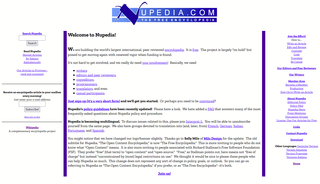
Free software or libre software is computer software distributed under terms that allow users to run the software for any purpose as well as to study, change, and distribute it and any adapted versions. Free software is a matter of liberty, not price; all users are legally free to do what they want with their copies of a free software regardless of how much is paid to obtain the program. Computer programs are deemed "free" if they give end-users ultimate control over the software and, subsequently, over their devices.

GNU is an extensive collection of free software, which can be used as an operating system or can be used in parts with other operating systems. The use of the completed GNU tools led to the family of operating systems popularly known as Linux. Most of GNU is licensed under the GNU Project's own General Public License (GPL).
PHP-Nuke is a web-based automated news publishing and content management system based on PHP and MySQL originally written by Francisco Burzi. The system is controlled using a web-based user interface. PHP-Nuke was originally a fork of the Thatware news portal system by David Norman.

The GNU Project is a free software, mass collaboration project announced by Richard Stallman on September 27, 1983. Its goal is to give computer users freedom and control in their use of their computers and computing devices by collaboratively developing and publishing software that gives everyone the rights to freely run the software, copy and distribute it, study it, and modify it. GNU software grants these rights in its license.
An application program is a computer program designed to carry out a specific task other than one relating to the operation of the computer itself, typically to be used by end-users. Word processors, media players, and accounting software are examples. The collective noun "application software" refers to all applications collectively. The other principal classifications of software are system software, relating to the operation of the computer, and utility software ("utilities").
The Debian Free Software Guidelines (DFSG) is a set of guidelines that the Debian Project uses to determine whether a software license is a free software license, which in turn is used to determine whether a piece of software can be included in Debian. The DFSG is part of the Debian Social Contract.

GNE was a project to create a free content online encyclopedia, licensed under the GNU Free Documentation License, under the auspices of the Free Software Foundation. The project was proposed by Richard Stallman in December 2000 and officially started in January 2001. It was moderated by Héctor Facundo Arena, an Argentine programmer and GNU activist.

Richard Matthew Stallman, also known by his initials, rms, is an American free software movement activist and programmer. He campaigns for software to be distributed in such a manner that its users have the freedom to use, study, distribute, and modify that software. Software that ensures these freedoms is termed free software. Stallman launched the GNU Project, founded the Free Software Foundation (FSF) in October 1985, developed the GNU Compiler Collection and GNU Emacs, and wrote the GNU General Public License.
The ISC license is a permissive free software license published by the Internet Software Consortium, now called Internet Systems Consortium (ISC). It is functionally equivalent to the simplified BSD and MIT licenses, but without language deemed unnecessary following the Berne Convention.

Free content, libre content, libre information, or free information, is any kind of functional work, work of art, or other creative content that meets the definition of a free cultural work.

A free-software license is a notice that grants the recipient of a piece of software extensive rights to modify and redistribute that software. These actions are usually prohibited by copyright law, but the rights-holder of a piece of software can remove these restrictions by accompanying the software with a software license which grants the recipient these rights. Software using such a license is free software as conferred by the copyright holder. Free-software licenses are applied to software in source code and also binary object-code form, as the copyright law recognizes both forms.

The GNU General Public License is a series of widely used free software licenses that guarantee end users the four freedoms to run, study, share, and modify the software. The license was the first copyleft for general use and was originally written by the founder of the Free Software Foundation (FSF), Richard Stallman, for the GNU Project. The license grants the recipients of a computer program the rights of the Free Software Definition. These GPL series are all copyleft licenses, which means that any derivative work must be distributed under the same or equivalent license terms. It is more restrictive than the Lesser General Public License and even further distinct from the more widely used permissive software licenses BSD, MIT, and Apache.

The GNU Free Documentation License is a copyleft license for free documentation, designed by the Free Software Foundation (FSF) for the GNU Project. It is similar to the GNU General Public License, giving readers the rights to copy, redistribute, and modify a work and requires all copies and derivatives to be available under the same license. Copies may also be sold commercially, but, if produced in larger quantities, the original document or source code must be made available to the work's recipient.

DMOZ was a multilingual open-content directory of World Wide Web links. The site and community who maintained it were also known as the Open Directory Project (ODP). It was owned by AOL but constructed and maintained by a community of volunteer editors.

Nupedia was an English-language, online encyclopedia whose articles were written by volunteer contributors with appropriate subject matter expertise, reviewed by expert editors before publication, and licensed as free content. It was founded by Jimmy Wales and underwritten by Bomis, with Larry Sanger as editor-in-chief. Nupedia operated from October 1999 until September 2003. It is best known today as the predecessor of Wikipedia. Nupedia had a seven-step approval process to control content of articles before being posted, rather than live wiki-based updating. Nupedia was designed by committee, with experts to predefine the rules, and it had only 21 articles in its first year, compared to Wikipedia posting 200 articles in the first month, and 18,000 in the first year.

The Definition of Free Cultural Works is a definition of free content from 2006. The project evaluates and recommends compatible free content licenses.
Software categories are groups of software. They allow software to be understood in terms of those categories, instead of the particularities of each package. Different classification schemes consider different aspects of software.
The following outline is provided as an overview of and topical guide to the Perl programming language:
Open source is source code that is made freely available for possible modification and redistribution. Products include permission to use the source code, design documents, or content of the product. The open-source model is a decentralized software development model that encourages open collaboration. A main principle of open-source software development is peer production, with products such as source code, blueprints, and documentation freely available to the public. The open-source movement in software began as a response to the limitations of proprietary code. The model is used for projects such as in open-source appropriate technology, and open-source drug discovery.











